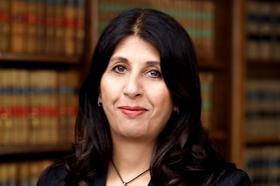I have been following the many discussions about judicial diversity with great interest and indeed this is an area that falls within my presidential priorities. So I was delighted to hear about a new scheme to build bridges into, and with, the judiciary for lawyers from diverse backgrounds, which is open for applicants now.

The Judicial Reverse Mentoring Scheme is open to solicitors, barristers, professionally qualified legal academics and fellows of the Chartered Legal Executives who attended a non-fee paying state school, those from ethnic minority backgrounds and lawyers who were the first generation in their family to attend university.
The scheme matches legal professionals from under-represented groups to mentor a judge (who will be their mentee). Unlike more traditional forms of mentoring, there is a strong focus on an exchange of learning between both parties.
Developed with the guidance of Professor Leslie Thomas KC and Kate Brunner KC, who work on the South East Circuit, with the lead of Mrs Justice Cheema-Grubb and Mr Justice Bryan, the scheme aims to foster greater understanding in the judiciary of the experience of lawyers from under-represented groups and the barriers they face in the profession at large as well as to progression in the judiciary.
The scheme also provides a safe space to learn from someone with more understanding of, and experience in the judiciary, share issues to do with judicial office applications and receive guidance, support and advice from a mentor judge.
Reverse mentoring is not a new idea, but it has proven to be a popular method of mentorship across sectors. It was spearheaded by Jack Welch, the former CEO of General Electric.
In 1999, his pilot project saw 500 senior and junior employees paired in the hope junior colleagues could teach their senior colleagues about technological advances.
Jack Welch said at the time: 'We tipped the organisation upside down. We now have the youngest and brightest teaching the oldest.'
The legal sector has also taken up the scheme, with Reed Smith, Fox Williams, Clifford Chance and Freshfields among those launching reverse mentor programmes in recent years.
The Law Society supports reverse mentoring as it gives both employers and employees a better understanding of experiences different to their own.
This can help create greater cohesion and a sense of community within organisations of all sizes, as well as fostering appreciation for the variety of contributions and insight people bring to their work.
The application deadline for the Judicial Reverse Mentoring Scheme closes on Monday 27 February 2023. I encourage solicitors from socio-economic disadvantaged backgrounds, those from the LGBTQ+ community, Black Asian and minority ethnic, and women solicitors to participate in the scheme.
If you have any questions to do with the scheme, please contact the Judicial Office.
Lubna Shuja is president of the Law Society of England and Wales































1 Reader's comment